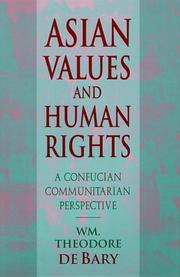| Listing 1 - 3 of 3 |
Sort by
|

ISBN: 9780674001961 0674001966 0674049551 0674271955 Year: 1998 Publisher: Cambridge, Mass.: Harvard university press,
Abstract | Keywords | Export | Availability | Bookmark
 Loading...
Loading...Choose an application
- Reference Manager
- EndNote
- RefWorks (Direct export to RefWorks)
Asian values --- Confucianism --- individualism --- personhood --- laws --- rites --- education --- Chinese constitutionalism --- civil society --- women's education --- women's rights --- Chinese communism --- Confucian communitarianism
Book
ISBN: 0520303695 0520972821 9780520972827 9780520303690 Year: 2019 Publisher: Oakland University of California Press
Abstract | Keywords | Export | Availability | Bookmark
 Loading...
Loading...Choose an application
- Reference Manager
- EndNote
- RefWorks (Direct export to RefWorks)
A free ebook version of this title is available through Luminos, University of California Press's Open Access publishing program. Visit www.luminosoa.org to learn more. This book is freely available in an open access edition thanks to TOME (Toward an Open Monograph Ecosystem)-a collaboration of the Association of American Universities, the Association of University Presses, and the Association of Research Libraries-and the generous support of the University of California, Davis. Learn more at the TOME website, available at: openmonographs.org.Creating the Intellectual redefines how we understand relations between intellectuals and the Chinese socialist revolution of the last century. Under the Chinese Communist Party, "the intellectual" was first and foremost a widening classification of individuals based on Marxist thought. The party turned revolutionaries and otherwise ordinary people into subjects identified as usable but untrustworthy intellectuals, an identification that profoundly affected patterns of domination, interaction, and rupture within the revolutionary enterprise. Drawing on a wide range of data, Eddy U takes the reader on a journey that examines political discourses, revolutionary strategies, rural activities, urban registrations, workplace arrangements, organized protests, and theater productions. He lays out in colorful detail the formation of new identities, forms of organization, and associations in Chinese society. The outcome is a compelling picture of the mutual constitution of the intellectual and the Chinese socialist revolution, the legacy of which still affects ways of seeing, thinking, acting, and feeling in what is now a globalized China.
Communism and intellectuals --- Social stratification --- History --- China --- Intellectual life --- Stratification, Social --- Equality --- Social structure --- Social classes --- Intellectuals and communism --- Intellectuals --- HISTORY / Asia / General. --- associations. --- chinese communist party. --- chinese society. --- compelling. --- formation of new identities. --- forms of organization. --- globalized china. --- intellectuals and chinese socialist revolution. --- marxist classification of individuals. --- organized protests. --- political discourses. --- revolutionary strategies. --- rural activities. --- study of chinese communism. --- theater productions. --- urban registrations. --- workplace arrangements. --- HISTORY / Asia / General
Book
ISBN: 1280882050 9786613723369 0520954033 9780520954038 9780520271890 0520271890 9780520271906 0520271904 9781280882050 6613723363 Year: 2012 Publisher: Berkeley : University of California Press,
Abstract | Keywords | Export | Availability | Bookmark
 Loading...
Loading...Choose an application
- Reference Manager
- EndNote
- RefWorks (Direct export to RefWorks)
How do we explain the surprising trajectory of the Chinese Communist revolution? Why has it taken such a different route from its Russian prototype? An answer, Elizabeth Perry suggests, lies in the Chinese Communists' creative development and deployment of cultural resources - during their revolutionary rise to power and afterwards. Skillful "cultural positioning" and "cultural patronage," on the part of Mao Zedong, his comrades and successors, helped to construct a polity in which a once alien Communist system came to be accepted as familiarly "Chinese." Perry traces this process through a case study of the Anyuan coal mine, a place where Mao and other early leaders of the Chinese Communist Party mobilized an influential labor movement at the beginning of their revolution, and whose history later became a touchstone of "political correctness" in the People's Republic of China. Once known as "China's Little Moscow," Anyuan came over time to symbolize a distinctively Chinese revolutionary tradition. Yet the meanings of that tradition remain highly contested, as contemporary Chinese debate their revolutionary past in search of a new political future.
Working class --- Labor movement --- Coal miners --- Social change --- Political culture --- Revolutions --- Communism --- History --- Social aspects --- Anyuan (Jiangxi Sheng, China : West) --- Social conditions --- Politics and government --- Economic conditions --- Bolshevism --- Communist movements --- Leninism --- Maoism --- Marxism --- Trotskyism --- Collectivism --- Totalitarianism --- Post-communism --- Socialism --- Village communities --- Insurrections --- Rebellions --- Revolts --- Revolutionary wars --- Political science --- Political violence --- War --- Government, Resistance to --- Culture --- Change, Social --- Cultural change --- Cultural transformation --- Societal change --- Socio-cultural change --- Social history --- Social evolution --- Colliers (Coal miners) --- Miners --- Labor and laboring classes --- Social movements --- Commons (Social order) --- Laboring class --- Labouring class --- Working classes --- Social classes --- Labor --- Employment --- An-yüan (Jiangxi Sheng, China : West) --- 20th century china. --- ancient china. --- asian history. --- asian politics. --- chinese communism. --- chinese communist party. --- chinese culture. --- chinese history. --- chinese isolation. --- chinese politics. --- communist revolution. --- easy to read. --- engaging. --- history of anyuan. --- history of communism. --- home school history books. --- how does communism work. --- learning from experts. --- mao zedong. --- nonfiction books. --- page turner. --- political science. --- politics and economy. --- quarantine books. --- red scare. --- russia communism. --- social politics. --- what is communism.
| Listing 1 - 3 of 3 |
Sort by
|

 Search
Search Feedback
Feedback About UniCat
About UniCat  Help
Help News
News